北师大版(2019)选择性必修 第二册Unit 6 The Media Grammar精品课件(共30张PPT)
文档属性
| 名称 | 北师大版(2019)选择性必修 第二册Unit 6 The Media Grammar精品课件(共30张PPT) |

|
|
| 格式 | pptx | ||
| 文件大小 | 943.6KB | ||
| 资源类型 | 教案 | ||
| 版本资源 | 北师大版(2019) | ||
| 科目 | 英语 | ||
| 更新时间 | 2023-03-16 21:41:04 | ||
图片预览

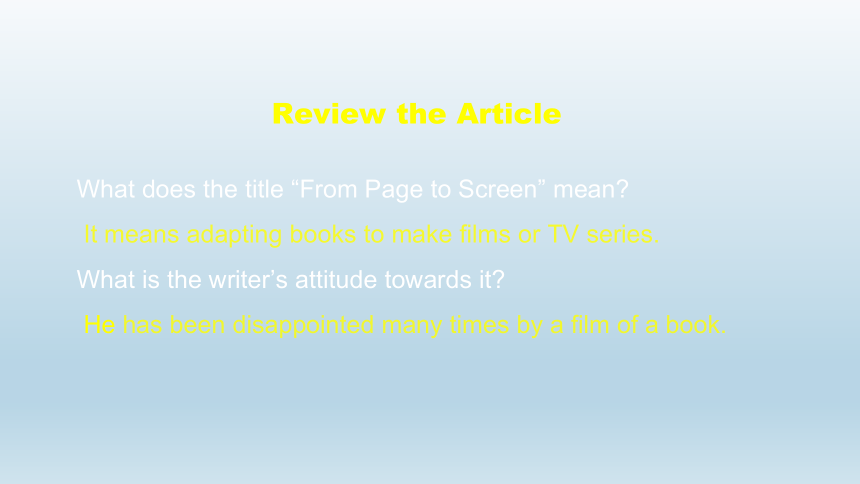
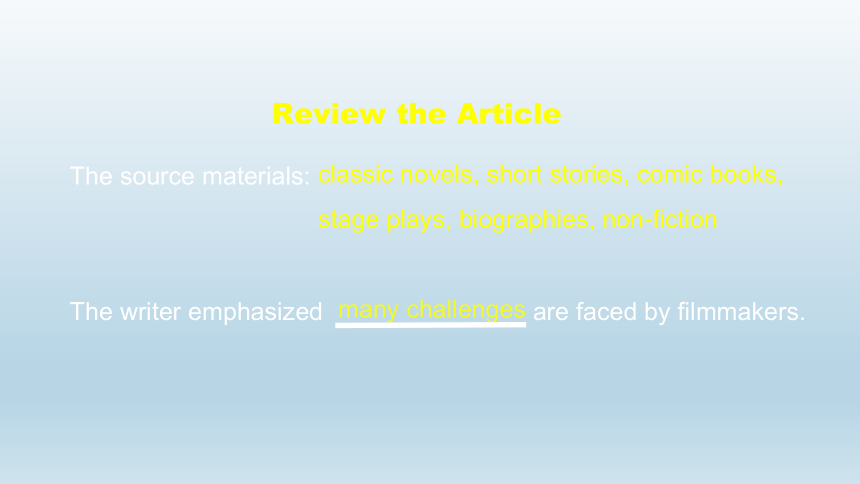
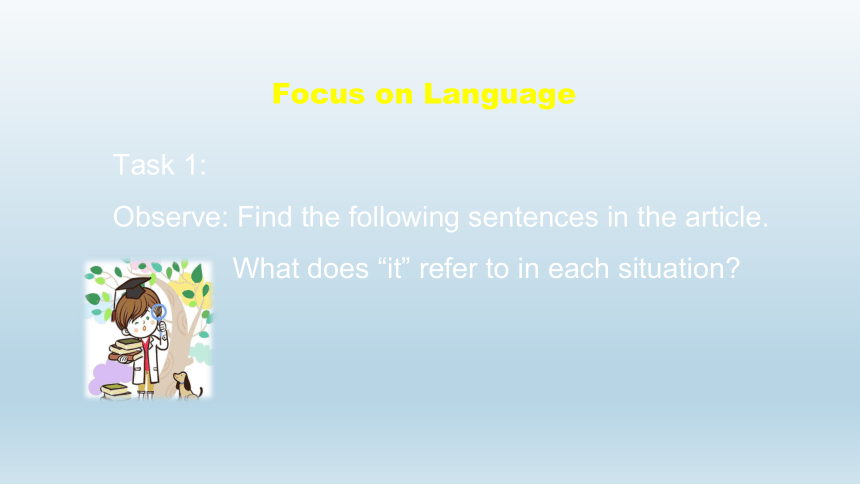
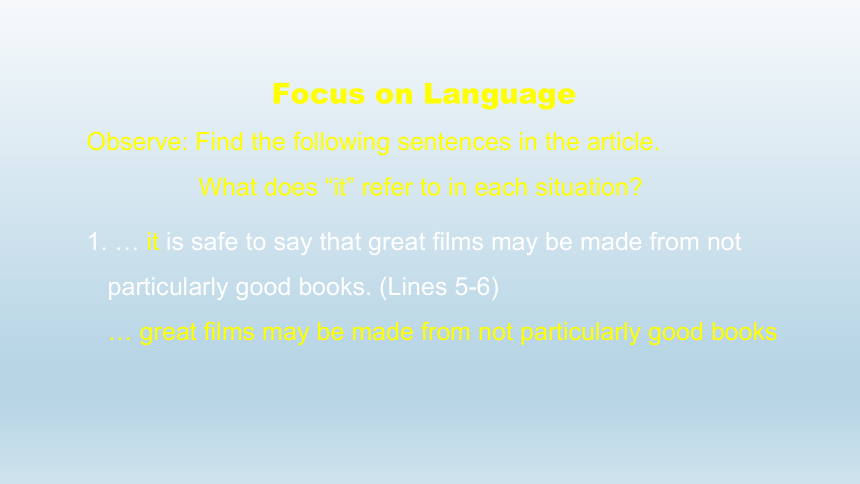
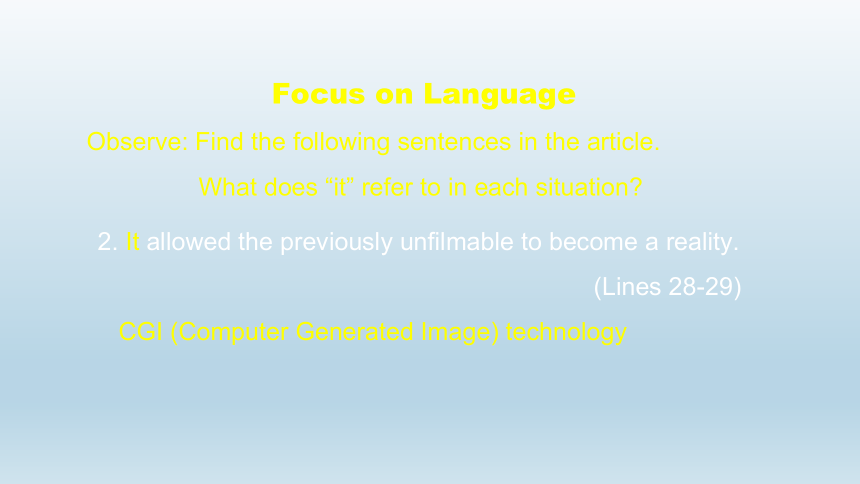


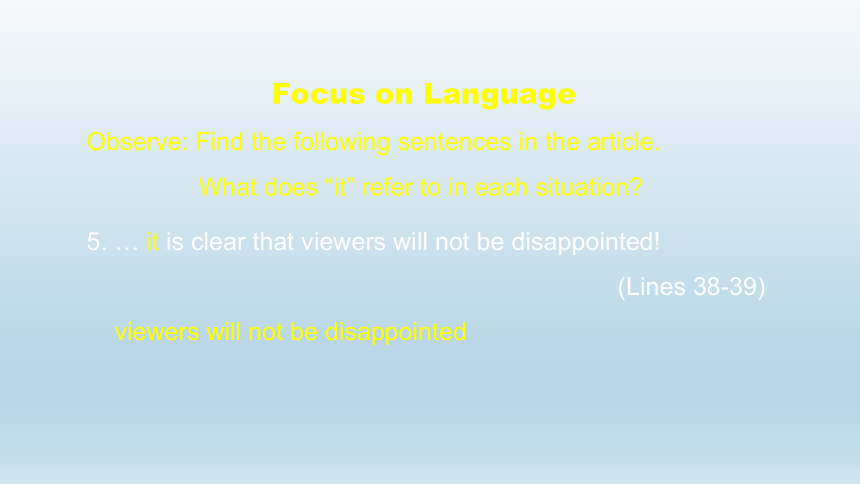
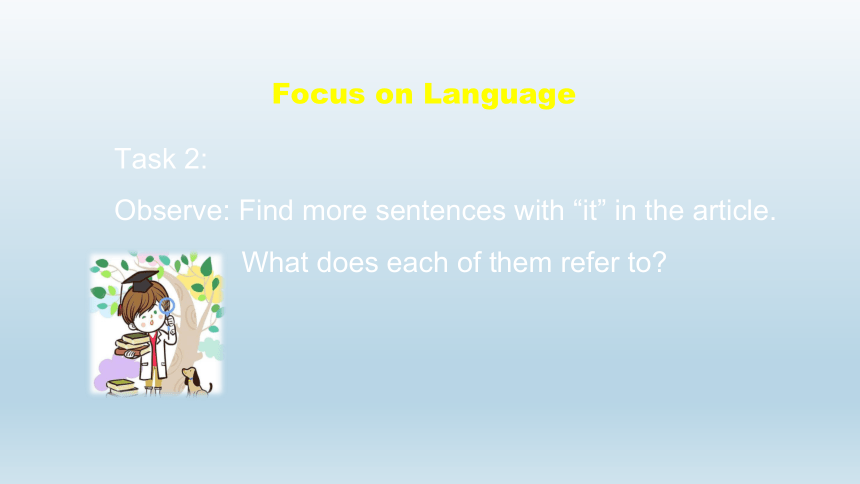
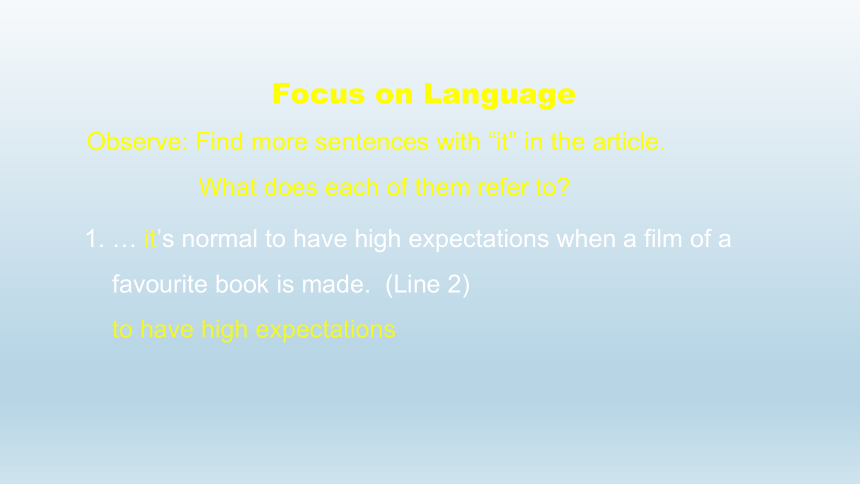
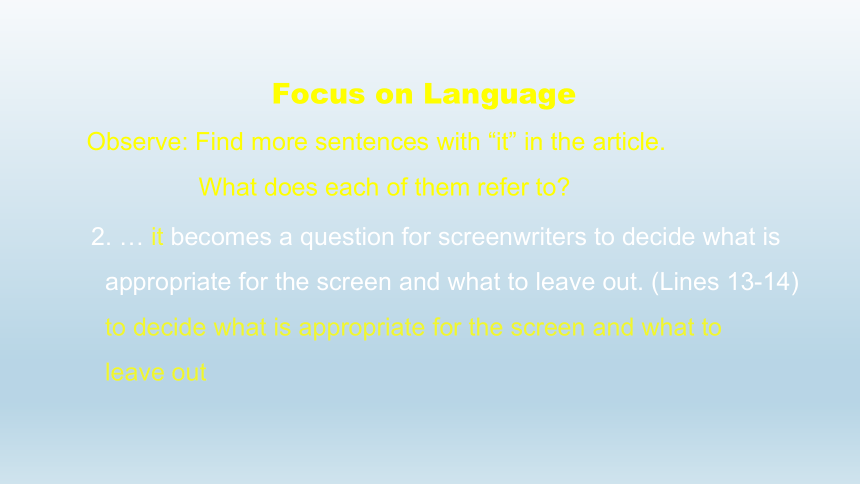
文档简介
(共30张PPT)
Unit6 The media
IT
Grammar
What does the title “From Page to Screen” mean
It means adapting books to make films or TV series.
What is the writer’s attitude towards it
He has been disappointed many times by a film of a book.
Review the Article
The source materials:
The writer emphasized are faced by filmmakers.
many challenges
classic novels, short stories, comic books, stage plays, biographies, non-fiction
Review the Article
Task 1:
Observe: Find the following sentences in the article.
What does “it” refer to in each situation
Focus on Language
1. … it is safe to say that great films may be made from not
particularly good books. (Lines 5-6)
… great films may be made from not particularly good books
Observe: Find the following sentences in the article.
What does “it” refer to in each situation
Focus on Language
2. It allowed the previously unfilmable to become a reality.
(Lines 28-29)
CGI (Computer Generated Image) technology
Focus on Language
Observe: Find the following sentences in the article.
What does “it” refer to in each situation
3. … it is the book writer who is in the best position to do film
adaptations. (Lines 30-31)
the book writer
Focus on Language
Observe: Find the following sentences in the article.
What does “it” refer to in each situation
4. … find it difficult to adapt to a new form. (Lines 33-34)
to adapt books to a new form
Focus on Language
Observe: Find the following sentences in the article.
What does “it” refer to in each situation
5. … it is clear that viewers will not be disappointed!
(Lines 38-39)
viewers will not be disappointed
Focus on Language
Observe: Find the following sentences in the article.
What does “it” refer to in each situation
Task 2:
Observe: Find more sentences with “it” in the article.
What does each of them refer to
Focus on Language
1. … it’s normal to have high expectations when a film of a
favourite book is made. (Line 2)
to have high expectations
Observe: Find more sentences with “it” in the article.
What does each of them refer to
Focus on Language
2. … it becomes a question for screenwriters to decide what is
appropriate for the screen and what to leave out. (Lines 13-14)
to decide what is appropriate for the screen and what to
leave out
Focus on Language
Observe: Find more sentences with “it” in the article.
What does each of them refer to
3. … it is always a bad idea to watch a film of a book you love.
(Line 39)
to watch a film of a book you love
Focus on Language
Observe: Find more sentences with “it” in the article.
What does each of them refer to
a. a third-person singular pronoun that refers to an object or
an idea
b. a pronoun that works as a formal subject / object
c. a pronoun that leads an emphasized part in a sentence
Focus on Language
Task 3: Read the sentences in Task 1.
Reflect: What is the function of “it” in each sentence
1. … it is safe to say that great films may be made from not
particularly good books. (Lines 5-6)
“It” means to say that great films may be made from not
particularly good books.
b. a pronoun that works as a formal subject
Focus on Language
Reflect: What is the function of “it” in each sentence
2. It allowed the previously unfilmable to become a reality.
(Lines 28-29)
“It” means CGI (Computer Generated Image) technology.
a. a third-person singular pronoun that refers to
an object or an idea
Focus on Language
Reflect: What is the function of “it” in each sentence
3. …it is the book writer who is in the best position to do film
adaptations. (Lines 30-31)
“It” means the book writer.
c .a pronoun that leads an emphasized part in a sentence
Focus on Language
Reflect: What is the function of “it” in each sentence
4. … find it difficult to adapt to a new form. (Lines 33-34)
“It” means to adapt books to a new form.
b. a pronoun that works as a formal object
Focus on Language
Reflect: What is the function of “it” in each sentence
5. … it is clear that viewers will not be disappointed!
(Lines 38-39)
“It” means viewers will not be disappointed.
b. a pronoun that works as a formal subject
Focus on Language
Reflect: What is the function of “it” in each sentence
Task 4:
Practice: Use “it” to write sentences according
to the requirements.
Focus on Language
1. Simon spent two hours finishing his homework.
Rewrite the sentence, using “it” to stand for “finishing his
homework”.
It took Simon two hours to finish his homework.
Focus on Language
Practice: Use “it” to write sentences according to the requirements.
2. They made such a film in one month, which was unbelievable.
Rewrite the sentence, using “it” to stand for “they made such a
film in one month”.
It was unbelievable that they made such a film in one month.
Focus on Language
Practice: Use “it” to write sentences according to the requirements.
3. Jason was reading the new comic book. He found reading the
book so interesting.
Rewrite the sentence, using “it” to stand for “reading the book”.
Jason found it so interesting to read the new comic book.
Focus on Language
Practice: Use “it” to write sentences according to the requirements.
4. The film is very interesting. Obviously the viewers will not be disappointed.
Rewrite the sentence, using “it” to stand for “the viewers will not be
disappointed”.
The film is very interesting. It is obvious that the viewers will not be
disappointed.
Focus on Language
Practice: Use “it” to write sentences according to the requirements.
5. I don’t find it easy to learn languages, and I improve my English only by
studying very hard.
Rewrite the sentence, using “it” to emphasize “only by studying very hard”.
I don’t find it easy to learn languages, and it is only by studying very
hard that I improve my English.
Focus on Language
Practice: Use “it” to write sentences according to the requirements.
Consolidation
Let’s review the three functions of “it”.
a. a third-person singular pronoun that refers to an object or
an idea
b. a pronoun that works as a formal subject / object
c. a pronoun that leads an emphasized part in a sentence
Translate the following sentences with “it”.
这本书的电影版很棒。电影版的每一个细节都忠实于原著。
The film of the book was amazing. It stuck to the original story in every last detail.
“It” is a third-person singular pronoun that refers to an object or
an idea.
Consolidation
Translate the following sentences with “it”.
1.学习一门外语很重要。
1. It is important to learn a foreign language.
2.我认为只买书不读书是没用的。
2. I think it is no use buying books without reading them.
“It” is a pronoun that works as a formal subject / object.
Consolidation
Translate the following sentences with “it”.
明天我们将开启新的旅程。(强调明天)
It is tomorrow that we will start our new journey.
“It” is a pronoun that leads an emphasized part in a sentence.
Consolidation
Homework
Write an essay to introduce one of your favourite films or TV series.
Requirements:
1. Introduce the basic information of the film or TV series;
2. Express your attitude towards it (provide reasons);
3. Use “it” in your essay with its different functions.
Unit6 The media
IT
Grammar
What does the title “From Page to Screen” mean
It means adapting books to make films or TV series.
What is the writer’s attitude towards it
He has been disappointed many times by a film of a book.
Review the Article
The source materials:
The writer emphasized are faced by filmmakers.
many challenges
classic novels, short stories, comic books, stage plays, biographies, non-fiction
Review the Article
Task 1:
Observe: Find the following sentences in the article.
What does “it” refer to in each situation
Focus on Language
1. … it is safe to say that great films may be made from not
particularly good books. (Lines 5-6)
… great films may be made from not particularly good books
Observe: Find the following sentences in the article.
What does “it” refer to in each situation
Focus on Language
2. It allowed the previously unfilmable to become a reality.
(Lines 28-29)
CGI (Computer Generated Image) technology
Focus on Language
Observe: Find the following sentences in the article.
What does “it” refer to in each situation
3. … it is the book writer who is in the best position to do film
adaptations. (Lines 30-31)
the book writer
Focus on Language
Observe: Find the following sentences in the article.
What does “it” refer to in each situation
4. … find it difficult to adapt to a new form. (Lines 33-34)
to adapt books to a new form
Focus on Language
Observe: Find the following sentences in the article.
What does “it” refer to in each situation
5. … it is clear that viewers will not be disappointed!
(Lines 38-39)
viewers will not be disappointed
Focus on Language
Observe: Find the following sentences in the article.
What does “it” refer to in each situation
Task 2:
Observe: Find more sentences with “it” in the article.
What does each of them refer to
Focus on Language
1. … it’s normal to have high expectations when a film of a
favourite book is made. (Line 2)
to have high expectations
Observe: Find more sentences with “it” in the article.
What does each of them refer to
Focus on Language
2. … it becomes a question for screenwriters to decide what is
appropriate for the screen and what to leave out. (Lines 13-14)
to decide what is appropriate for the screen and what to
leave out
Focus on Language
Observe: Find more sentences with “it” in the article.
What does each of them refer to
3. … it is always a bad idea to watch a film of a book you love.
(Line 39)
to watch a film of a book you love
Focus on Language
Observe: Find more sentences with “it” in the article.
What does each of them refer to
a. a third-person singular pronoun that refers to an object or
an idea
b. a pronoun that works as a formal subject / object
c. a pronoun that leads an emphasized part in a sentence
Focus on Language
Task 3: Read the sentences in Task 1.
Reflect: What is the function of “it” in each sentence
1. … it is safe to say that great films may be made from not
particularly good books. (Lines 5-6)
“It” means to say that great films may be made from not
particularly good books.
b. a pronoun that works as a formal subject
Focus on Language
Reflect: What is the function of “it” in each sentence
2. It allowed the previously unfilmable to become a reality.
(Lines 28-29)
“It” means CGI (Computer Generated Image) technology.
a. a third-person singular pronoun that refers to
an object or an idea
Focus on Language
Reflect: What is the function of “it” in each sentence
3. …it is the book writer who is in the best position to do film
adaptations. (Lines 30-31)
“It” means the book writer.
c .a pronoun that leads an emphasized part in a sentence
Focus on Language
Reflect: What is the function of “it” in each sentence
4. … find it difficult to adapt to a new form. (Lines 33-34)
“It” means to adapt books to a new form.
b. a pronoun that works as a formal object
Focus on Language
Reflect: What is the function of “it” in each sentence
5. … it is clear that viewers will not be disappointed!
(Lines 38-39)
“It” means viewers will not be disappointed.
b. a pronoun that works as a formal subject
Focus on Language
Reflect: What is the function of “it” in each sentence
Task 4:
Practice: Use “it” to write sentences according
to the requirements.
Focus on Language
1. Simon spent two hours finishing his homework.
Rewrite the sentence, using “it” to stand for “finishing his
homework”.
It took Simon two hours to finish his homework.
Focus on Language
Practice: Use “it” to write sentences according to the requirements.
2. They made such a film in one month, which was unbelievable.
Rewrite the sentence, using “it” to stand for “they made such a
film in one month”.
It was unbelievable that they made such a film in one month.
Focus on Language
Practice: Use “it” to write sentences according to the requirements.
3. Jason was reading the new comic book. He found reading the
book so interesting.
Rewrite the sentence, using “it” to stand for “reading the book”.
Jason found it so interesting to read the new comic book.
Focus on Language
Practice: Use “it” to write sentences according to the requirements.
4. The film is very interesting. Obviously the viewers will not be disappointed.
Rewrite the sentence, using “it” to stand for “the viewers will not be
disappointed”.
The film is very interesting. It is obvious that the viewers will not be
disappointed.
Focus on Language
Practice: Use “it” to write sentences according to the requirements.
5. I don’t find it easy to learn languages, and I improve my English only by
studying very hard.
Rewrite the sentence, using “it” to emphasize “only by studying very hard”.
I don’t find it easy to learn languages, and it is only by studying very
hard that I improve my English.
Focus on Language
Practice: Use “it” to write sentences according to the requirements.
Consolidation
Let’s review the three functions of “it”.
a. a third-person singular pronoun that refers to an object or
an idea
b. a pronoun that works as a formal subject / object
c. a pronoun that leads an emphasized part in a sentence
Translate the following sentences with “it”.
这本书的电影版很棒。电影版的每一个细节都忠实于原著。
The film of the book was amazing. It stuck to the original story in every last detail.
“It” is a third-person singular pronoun that refers to an object or
an idea.
Consolidation
Translate the following sentences with “it”.
1.学习一门外语很重要。
1. It is important to learn a foreign language.
2.我认为只买书不读书是没用的。
2. I think it is no use buying books without reading them.
“It” is a pronoun that works as a formal subject / object.
Consolidation
Translate the following sentences with “it”.
明天我们将开启新的旅程。(强调明天)
It is tomorrow that we will start our new journey.
“It” is a pronoun that leads an emphasized part in a sentence.
Consolidation
Homework
Write an essay to introduce one of your favourite films or TV series.
Requirements:
1. Introduce the basic information of the film or TV series;
2. Express your attitude towards it (provide reasons);
3. Use “it” in your essay with its different functions.
同课章节目录
- Unit 4 Humour
- Lesson 1 What’s So Funny?
- Lesson 2 Why Do We Need Humour?
- Lesson 3 My Favourite Comedian
- Unit 5 Education
- Lesson 1 Enlightening a Mind
- Lesson 2 The Objectives of Education
- Lesson 3 Understanding
- Unit 6 The Media
- Lesson 1 From Page to Screen
- Lesson 2 Questions about Media
- Lesson 3 The Advertising Game
